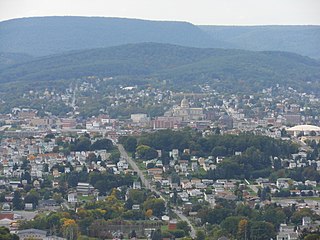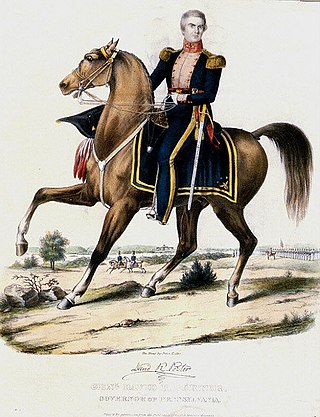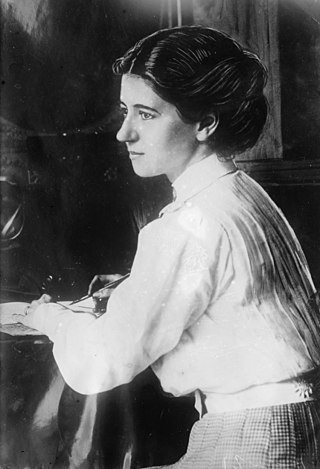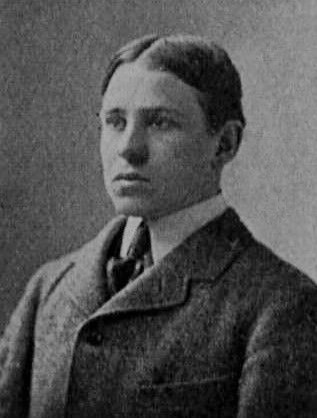Related Research Articles

Pennsylvania, officially the Commonwealth of Pennsylvania, is a state spanning the Mid-Atlantic, Northeastern, Appalachian, and Great Lakes regions of the United States. Pennsylvania borders Delaware to its southeast, Maryland to its south, West Virginia to its southwest, Ohio to its west, Lake Erie and the Canadian province of Ontario to its northwest, New York to its north, and the Delaware River and New Jersey to its east.

Altoona is a city in Blair County, Pennsylvania, United States. The population was 43,963 at the time of the 2020 census, making it the 18th-most populous city in Pennsylvania. It is the principal city of the Altoona metropolitan area, which includes all of Blair County and was recorded as having a population of 122,822 at the 2020 census.
The Pennsylvania Railroad, legal name The Pennsylvania Railroad Company, also known as the "Pennsy", was an American Class I railroad that was established in 1846 and headquartered in Philadelphia. It was named for the commonwealth in which it was established. At its peak in 1882, the Pennsylvania Railroad was the largest railroad, the largest transportation enterprise, and the largest corporation in the world.
Joseph Ritner was the eighth governor of Pennsylvania, and was a member of the Anti-Masonic Party. Elected governor during the 1835 Pennsylvania gubernatorial election, he served from 1835 to 1839.

David Rittenhouse Porter was the ninth governor of Pennsylvania. Voted into office during the controversial 1838 Pennsylvania gubernatorial election, which was characterized by intense anti-Masonic and anti-abolitionist rhetoric during and after the contest that sparked the post-election Buckshot War, he served as the state's chief executive officer from 1839 to 1845.
The Pennsylvania Historical and Museum Commission (PHMC) is the governmental agency of the Commonwealth of Pennsylvania, responsible for the collection, conservation, and interpretation of Pennsylvania's heritage. The commission cares for historical manuscripts, public records, and objects of historical interest; museums; archeology; publications; historic sites and properties; historic preservation; geographic names; and the promotion of public interest in Pennsylvania history.

The Drake Well Museum and Park is a museum that interprets the birth of the American oil industry in 1859 by "Colonel" Edwin Drake along the banks of Oil Creek in Cherrytree Township, Venango County, Pennsylvania in the United States. The museum collects and preserves related artifacts. The reconstructed Drake Well demonstrates the first practical use of salt drilling techniques for the extraction of petroleum through an oil well. A historic site, the museum is located in Cherrytree Township, 3 miles (4.8 km) south of Titusville on Drake Well Road, situated between Pennsylvania Routes 8 and 27. The museum is accredited by the American Alliance of Museums.

Erie Maritime Museum is a maritime museum located on Presque Isle Bay which rests on the waterfront in downtown Erie, Pennsylvania. It is managed by the Pennsylvania Historical and Museum Commission (PHMC). When it opened its doors on May 21, 1998, it became the first new Pennsylvania Historical and Museum Commission-affiliated museum in twenty years. Alongside its extensive indoor exhibits, it serves as the homeport for the US Brig Niagara, a modern recreation of the 1813-US Brig Niagara which served as Commodore Oliver Hazard Perry's relief flagship during the Battle of Lake Erie. While the museum focuses on the War of 1812 in the "frontier", it is designed to celebrate Erie's rich maritime heritage.

The Landis Valley Village & Farm Museum is a 100-acre living history museum located on the site of a former rural crossroads village in Lancaster, Pennsylvania. Founded by brothers Henry K. Landis and George Landis in 1925 and incorporated in 1941, it is now operated by the Pennsylvania Historical and Museum Commission. Its staff and volunteers collect, conserve, exhibit, and interpret Pennsylvania German material, culture, history and heritage from 1740 through 1940.

During the American Civil War, the Commonwealth of Pennsylvania played a critical role in the Union, providing a substantial supply of military personnel, equipment, and leadership to the Federal government. The state raised over 360,000 soldiers for the Federal armies. It served as a significant source of artillery guns, small arms, ammunition, armor for the new revolutionary style of ironclad types of gunboats for the rapidly expanding United States Navy, and food supplies. The Phoenixville Iron Company by itself produced well over 1,000 cannons, and the Frankford Arsenal was a major supply depot.

Violet Oakley was an American artist. She was the first American woman to receive a public mural commission. During the first quarter of the twentieth century, she was renowned as a pathbreaker in mural decoration, a field that had been exclusively practiced by men. Oakley excelled at murals and stained glass designs that addressed themes from history and literature in Renaissance-revival styles.

The Railroaders Memorial Museum (RMM) is a railroad museum in Altoona, Pennsylvania. The museum focuses on the history of railroad workers and railroad communities in central Pennsylvania, particularly Altoona, the Altoona Works, and the greater Pittsburgh area. Since 1998, the museum has been located in the Master Mechanics Building, built by the Pennsylvania Railroad in 1882. The museum also operates a separate museum, visitor center, and observation area at the Horseshoe Curve.

The Philadelphia Quartermaster Depot, now known as the Defense Logistics Agency Troop Support, was founded as the Schuylkill Arsenal in 1799.

The Pennsylvania State Archives is the official archive for the Commonwealth of Pennsylvania, administered as part of the Pennsylvania Historical and Museum Commission. Located at 350 North Street in the state capital of Harrisburg, it is a part of the Pennsylvania State Capitol Complex.

David Bustill Bowser was a 19th-century African-American ornamental artist and portraitist.

The Marian Anderson House is a historic home located in the Southwest Center City neighborhood of Philadelphia, Pennsylvania. Built circa 1870 in the same neighborhood where opera singer and civil rights advocate Marian Anderson was born 27 years later, this two-story, brick rowhouse dwelling was designed in the Italianate style. Purchased by Anderson in 1924, the same year she became the first African-American concert artist to record spirituals for a major American recording company, she continued to reside here until 1943. The house is currently home to the Marian Anderson Museum and Historical Society.

This is a timeline of women's suffrage in Pennsylvania. Activists in the state began working towards women's rights in the early 1850s, when two women's rights conventions discussed women's suffrage. A statewide group, the Pennsylvania Woman Suffrage Association (PWSA), was formed in 1869. Other regional groups were formed throughout the state over the years. Suffragists in Pittsburgh created the "Pittsburgh Plan" in 1911. In 1915, a campaign to influence voters to support women's suffrage on the November 2 referendum took place. Despite these efforts, the referendum failed. On June 24, 1919, Pennsylvania became the seventh state to ratify the Nineteenth Amendment. Pennsylvania women voted for the first time on November 2, 1920.

Marion Margery Warren Scranton was a 20th-century women’s suffrage activist and leading member of the Republican Party in the United States. Known as “the Duchess and the Grand Old Dame of the Grand Old Party,” she was described in Life magazine as “the woman Pennsylvania politicians still remember as ‘Margery,’ and ... the only woman who could wear two orchids through a coal mine and get away with it.”

Worthington Scranton was a 20th-century American lawyer, businessman, and philanthropist who became president of the Scranton Gas and Water Company in Scranton, Pennsylvania, a city which was named after his grandfather, Joseph Hand Scranton (1813-1872).
References
- ↑ "State Museum of Pennsylvania and Pennsylvania Heritage Foundation invite artists to enter Art of the State: Pennsylvania 2019 Juried Exhibition." Philadelphia, Pennsylvania: Philadelphia Free Press, February 6, 2019.
- ↑ "Gene Barr" (profile). Harrisburg, Pennsylvania: Pennsylvania Chamber of Commerce, retrieved online February 14, 2019.
- ↑ "Donna L. Fisher, Partner" (profile). Harrisburg, Pennsylvania: Pepper Hamilton LLP, retrieved online February 14, 2019.
- ↑ "Alison T. Young," in "Who's Next in Politics: 19 young people making a difference in Philly." Philadelphia, Pennsylvania: Billy Penn, November 22, 2016.
- ↑ "Mission & History." Harrisburg, Pennsylvania: Pennsylvania Heritage Foundation, retrieved online February 14, 2019.
- ↑ "National Archives Grants - November 2018: Access to Historical Records: Major Initiatives". Washington, D.C.: National Historical Publications & Records Commission, National Archives, November 2018 (retrieved online February 14, 2019).
- ↑ "Popular Archives Without Tears Workshop Comes to Drake Well Museum," in Erie Yesterday. Erie, Pennsylvania: Historical Society of Erie County, May 13, 2014.
- ↑ "Bykofsky, Stu. "Dying to do the right thing, he gets a tax bill." Philadelphia, Pennsylvania: The Inquirer, August 16, 2018.
- ↑ "Value of History." Harrisburg, Pennsylvania: Pennsylvania Heritage Foundation, retrieved online February 14, 2019.
- ↑ Grove, Tim. "What is the 'History Relevance Campaign?'" Indianapolis, Indiana: National Council of Public History, October 25, 2013.
- ↑ George, Joseph and Barrie Ann. "Art: 'Art of the State' celebrates Pennsylvania arts." Carlisle, Pennsylvania: The Sentinel, July 17, 2019.
- ↑ "Our Mission." Harrisburg, Pennsylvania: Pennsylvania Heritage Foundation, retrieved online February 14, 2019.
- ↑ "Pennsylvania Heritage Magazine." Harrisburg, Pennsylvania: Pennsylvania Heritage Foundation, retrieved online February 14, 2019.
- ↑ Keith, Patt. "'Streamliner': Altoonan pens story of industrial designer Raymond Loewy." Altoona, Pennsylvania: Altoona Mirror, November 18, 2018.
- ↑ Weeks, Linton. "The Sad, Happy Life of Harry Whittier Frees." Washington, D.C.: NPR, January 6, 2016.
- ↑ Litvak, Anya. "Natural gas, coal have defined Pittsburgh's history." Pittsburgh, Pennsylvania: Pittsburgh Post-Gazette, September 17, 2014.
- ↑ "Preserving and Sharing History for All Pennsylvanians: Annual Report, 2020-2021." Harrisburg, Pennsylvania: Pennsylvania Historical and Museum Commission.
- ↑ Stetler, Christina M. "The 1918 Spanish Influenza: Three Months of Horror in Philadelphia," in Pennsylvania History: A Journal of Mid-Atlantic Studies, Vol. 84, No. 4, pp. 462-487. University Park, Pennsylvania: Penn State University Press, Autumn 2017.
